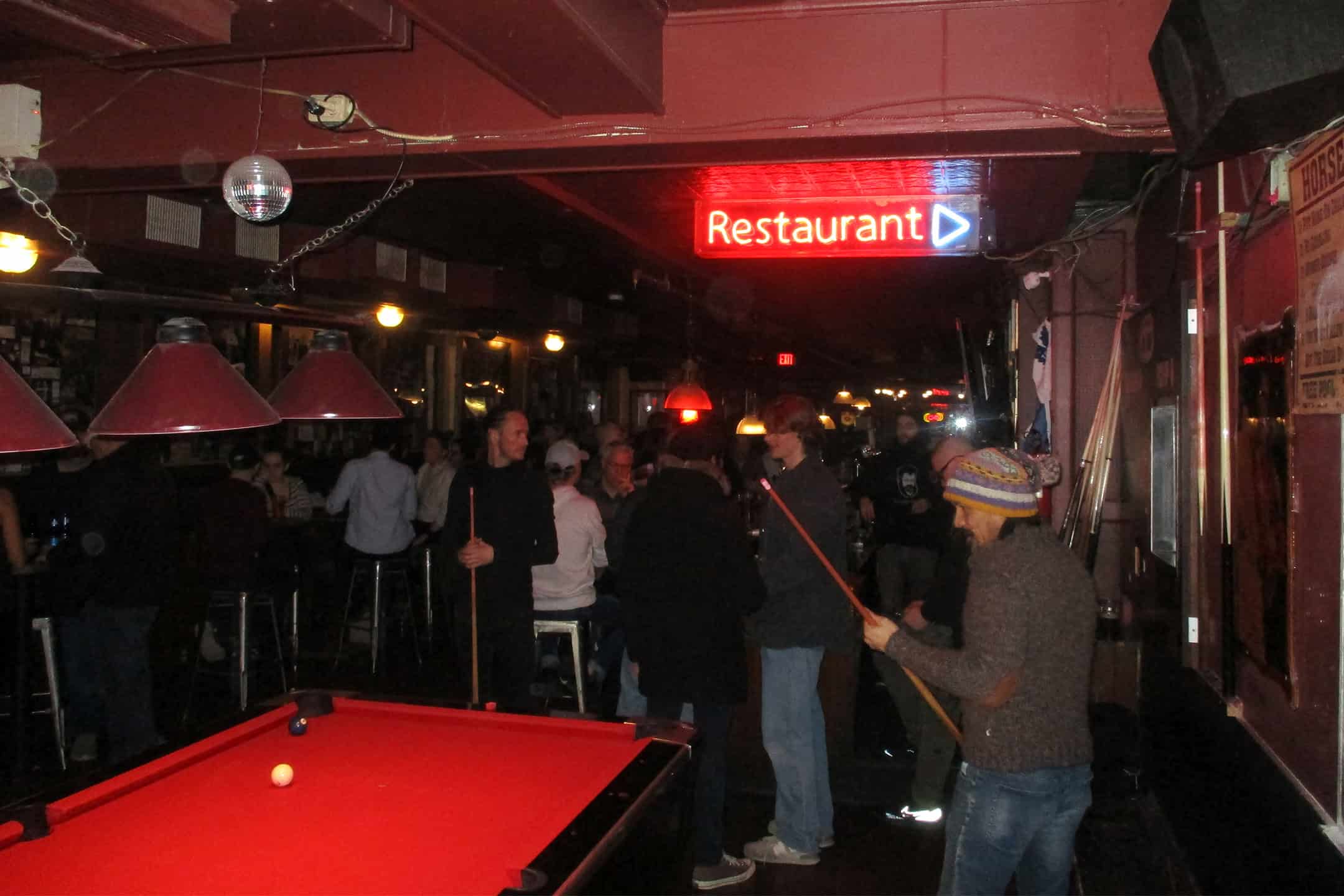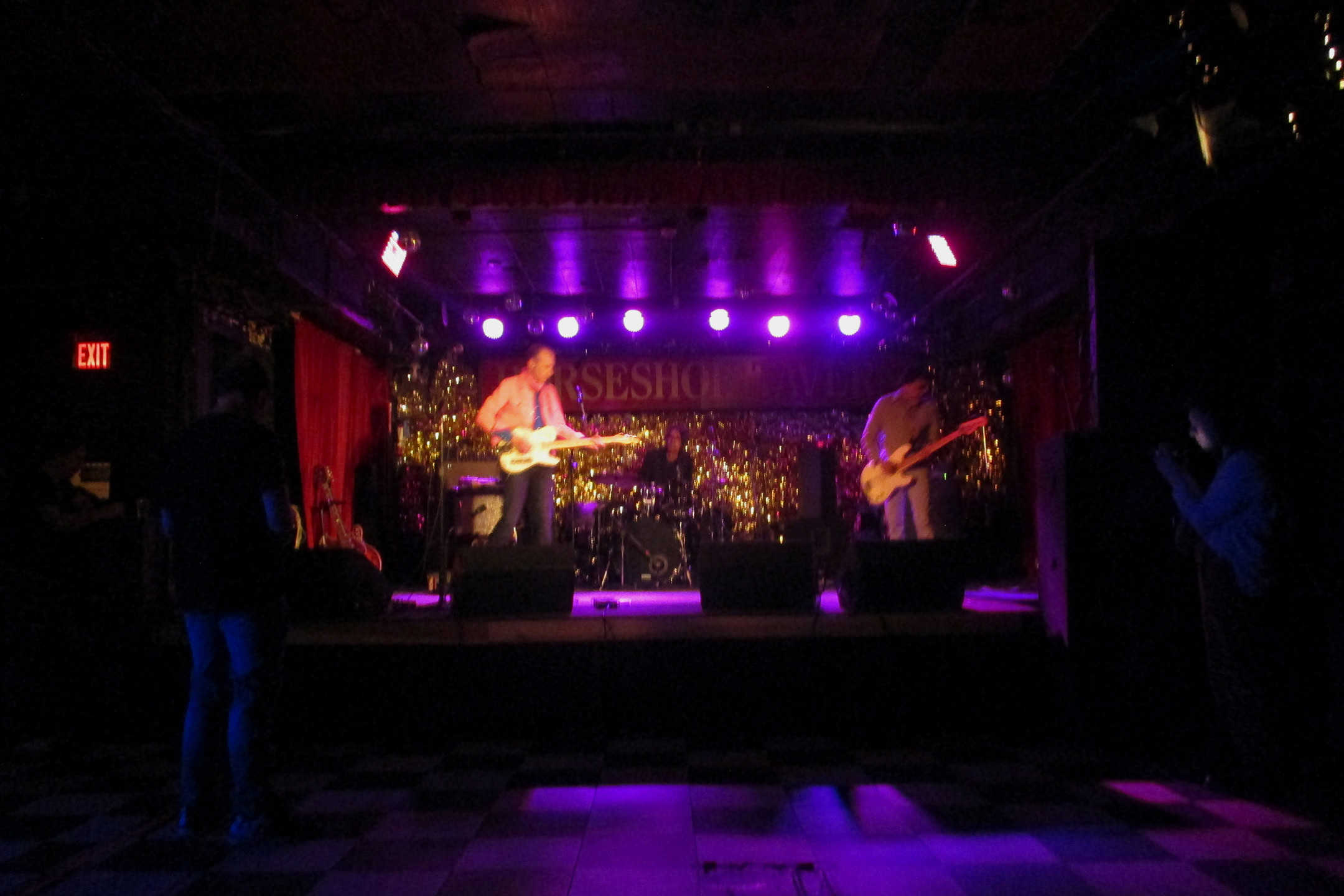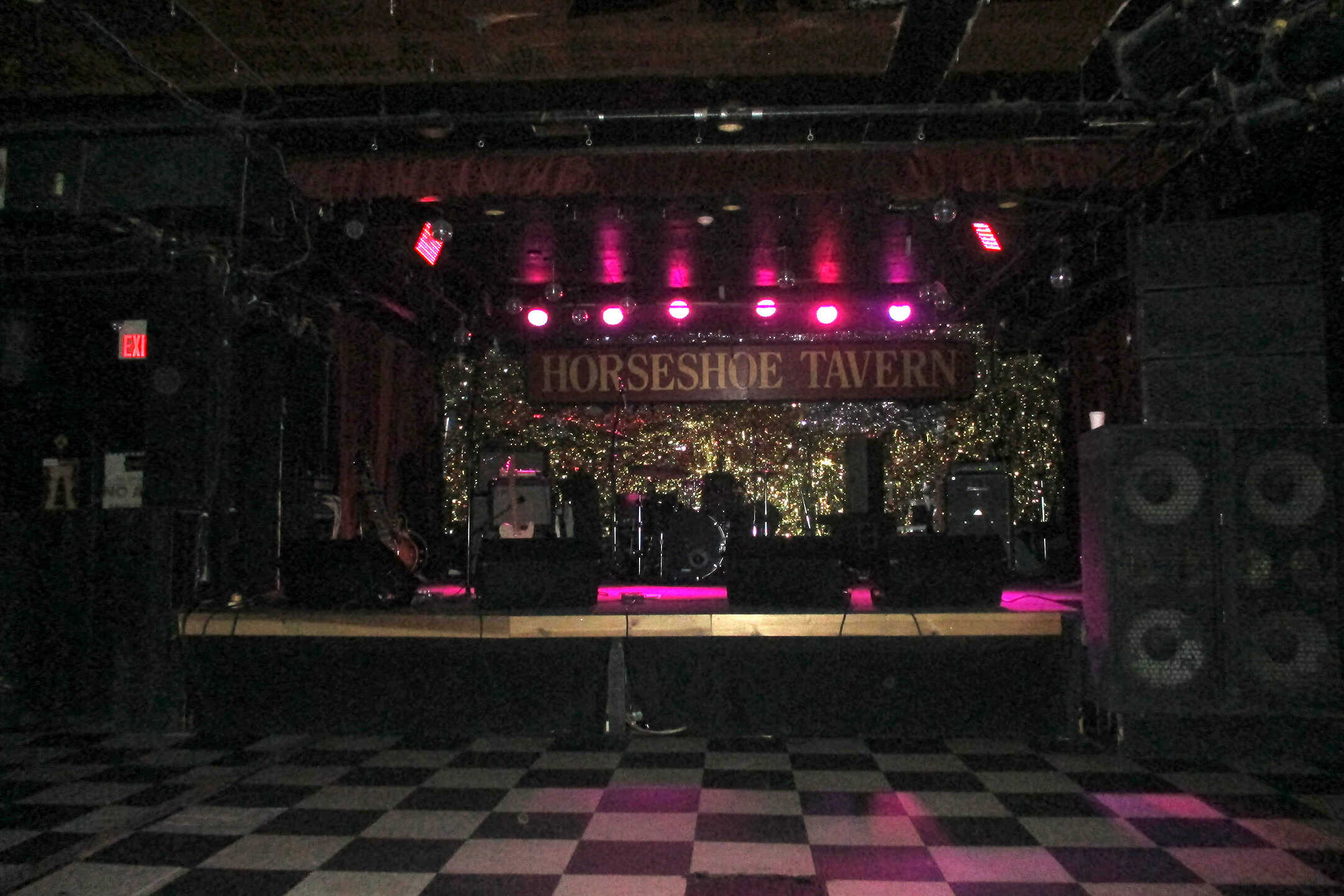As I was ushered into the Horseshoe Tavern by a burly security guard on a windy Saturday night, one thing was immediately clear: I was out of place. Despite my freshly cut bangs and oversized cowboy boots that I intentionally chose to look the part, I wasn’t nearly cool enough for the legendary Queen Street West establishment.
As a book and media studies student who reads extensively in my spare time, I’m drawn to journalism for its ability to immerse you in any subject of interest. Reading writer and journalist Joan Didion’s profound observations on the complexities of the human experience inspired me to explore human identity myself as a 20-something constantly seeking to understand who I am. Wanting to research how music shapes personal identity, I looked for a place with a rich history and community. As someone who has always loved music, the Horseshoe Tavern seemed perfect after my mother suggested it, prompting me to start digging into its story.
To me, the Horseshoe Tavern is Toronto’s most iconic concert venue. Originally a bar frequented by bike gangs, it later transformed into a concert hotspot, hosting a myriad of internationally acclaimed artists from the 1950s onward — including The Rolling Stones, The Ramones, The Pixies, and The Police. By fostering an environment independent of mainstream pressures and supportive of young artists, the Horseshoe Tavern helped Canadian bands like The Tragically Hip and The Phantoms rise to fame. Ever listened to The Tragically Hip’s song, “Bobcaygeon?” Those “checkerboard floors” lead singer Gordon Downie mentions? They’re from the stage at the Horseshoe Tavern.
When I eagerly emailed the venue owner, Jeff Cohen, to interview him about music and the community surrounding the Horseshoe Tavern, he responded: “Just ask [for] Andrew to direct you to Teddy, the bartender.” So, I bought a ticket to that night’s show, featuring the Vancouver-based punk rock band Veal — and thus my investigation began.
Searching for Teddy
With only the name “Andrew” to base my search on, I observed my surroundings and planned my next move. Everyone at the Horseshoe Tavern seemed so comfortable in their seats. When I walked in, I didn’t feel like I was entering a bar, but rather someone’s family home. I felt like a door-to-door salesperson, desperately trying to sell myself as cool. Uncertain, I made my way to the bar counter and stood there.
As I waited for the bartender’s attention — though not the one I was looking for — I began to observe: every leg at the bar was crossed with style, every figure exuding suavity while hunched over the red felt pool table, carefully eyeing the ball to sink it. A group of friends huddled by the A&W pickup window inside the Horseshoe Tavern, chewing on burgers and engaged in drunken conversation. Women whispered into their partners’ ears, while a man raised a finger to signal the bartender, swiftly receiving a beer in return.
And then there was me, standing next to these regulars in their designated seats, arms awkwardly resting on the bar. Just as I wondered whether I should pull out my ID — knowing I looked under 25 — a voice snapped me out of my self-conscious spiral.
“I’ll be with ya in just a second,” a woman chimed in my direction as she placed another draught in front of a patron next to me. But I wasn’t intending to order a drink — I was trying to find Teddy, the bartender. When the woman finally glanced at me, signalling that it was my turn, I asked where I could find Andrew, to find Teddy. “Oh, Teddy’s at the stage bar,” she said. “There’s another bar?” I asked, surprised. Immediately after, I croaked, “Oh, right! Thanks!” and faked a confident waltz past the pool table toward the ticket-only stage area.

The bar behind the bar
The stage area wasn’t fancy: black-and-white checkered floors, padded metal chairs, and long wooden planks for tables sticky with years of drinking to bands like Talking Heads, The Shins, Mitski, and Big Thief. It was undeniably tasteful.
The stage gleamed with a sparkly confetti backdrop and miniature disco balls hanging from the ceiling. The walls were painted black, adorned with gold records, green and red string lights, and painted cowboy murals. This room had an identity all on its own.
I had arrived about half an hour before the show to talk to Teddy and had some time to observe my surroundings. Sipping a Bud Light he had cracked open for me, I watched from my seat in the front row as the room quickly began to fill. To my left was the stage bar, where two bartenders were deep in conversation with a couple of patrons who seemed like comfortable regulars. One of them must have been Teddy but of course, I approached the wrong one.
After approaching the wrong bartender Andrew, who pointed me overtly toward the man I was looking for, I finally found myself face-to-face with Teddy. With his slicked-back hair, pierced ears, denim button-down, and green bandana around his neck, it suddenly made sense that this was the guy I had been searching for. Just to be sure, I asked, “Is Teddy working tonight?”
He threw up his arms and laughed.
Teddy Fury is a charismatic man with unmistakable charm. He radiates coolness. Even before he told me that his favourite show at the Horseshoe Tavern was when The Rolling Stones played in 1997, I could’ve already guessed he’d served Keith Richards a beer. He’s one of those people whose presence lingers in your mind long after the encounter. His style is so intense that when you’re in front of him, you can’t help but think, I’m an idiot: of course, that’s Teddy.
Thus began our conversation about music, identity, and his time at the legendary Horseshoe Tavern. In addition to being a fan of the music scene, Teddy frequented the Horseshoe Tavern as “a professional, so-called professional rock-and-roll musician.”
In the ’70s and ’80s, the Horseshoe Tavern was the go-to place for aspiring musicians. “You know, people get record deals out of [performing],” Teddy said. “I did that for a long time. And when I got burnt out and couldn’t really do it for a living anymore, a guy named X-Ray MacRae… offered me a job.”
Michael MacRae, the former owner of the Horseshoe Tavern, passed away in January. When the young Teddy had told MacRae he had no bartending experience, MacRae responded, “Well we’ve seen you on this side of the bar,” referring to the stage. “You’ll be pretty good on the other side!”
Teddy is an extremely busy man, and I was lucky to get 10 minutes of his time on a Saturday night. While I would have loved to listen endlessly to stories of his experiences with musical legends, I left him to his work after having him pose for a photo, during which he insisted on holding up his favourite red bottle opener. I thanked him, we shook hands, and I took my seat.

The show of the night
Getting to go backstage at the Horseshoe Tavern felt like I was now part of a secret. The opening performance of the night was from Toronto-based guitarist Nichol Robertson, who played a funky-sounding successful tune that excited the growing crowd. The main show of the night featured Veal, a nihilistic late-1990s punk-rock band on a comeback tour. I didn’t know any of the songs they were playing, but I immediately found myself tapping my foot and nodding along with the crowd of passionate fans.
I love exploring different genres of music and have always found that music plays an important part in my identity. My knowledge of music lies mostly in the classic rock genre, as that was what I grew up listening to with my mother. Being unfamiliar with the sounds of punk rock, Veal was refreshing, intense, and undeniably intriguing. Listening to them play was like drinking a big can of Red Bull, which got my blood stirring again after Nichol Robertson’s jazzy, slow-cooked grooves.
I was buzzing with excitement after my conversation with Teddy. His openness eased my nerves as I let myself fall into the world of Veal. My mind ventured into thinking about the venue itself, rather than about my place in it.
Concerts hosted in larger venues like the Budweiser Stage in Toronto tend to be suffocating and uncomfortable. You’d struggle to relax and lack room to dance when standing in an unwelcoming concrete stadium so far away from the main stage where you can’t even hear or see the artist. Veal’s set was unlike any concert-going experience I had prior because I felt like I could both move and breathe freely.
The Saturday night at the Horseshoe Tavern was filled with couples rushing up from their seats to hold each other for a dance. People were dressed like cowboys, yelling along with an angry song about Parkdale, and throwing their arms, legs, and bodies around in a frenzy of movement. The venue was filled with guitarists on the stage poking at the hanging disco balls which sparkled with delight. One band member’s wife sang backup vocals in beautiful harmony before later joining the crowd, hugging and dancing along with us.
I felt a profound sense of community I have rarely seen in a post-COVID-19 pandemic world which left people riddled with social anxieties. For those few hours at the Horseshoe Tavern, time was suspended. It didn’t matter who was a regular, who Teddy was, or who I was. I saw strangers become friends and first dates become something more.
At one point, I turned back and noticed Teddy swaying along to the music. I caught his eye and he smiled at me as if to say “These guys rock, right?” At that moment, what he told me about his love for the Horseshoe Tavern echoed in my mind.
“When I’m getting ready to come here, it’s more like, ‘Oh, yeah, I’m going to the Horseshoe.’ It’s not like, ‘Oh, I’m going to work.’ It’s not that kind of environment.”
An immersive experience with music is precisely what the Horseshoe Tavern fosters. The entire room was completely immersed at that moment, and I noticed I didn’t see any phone for the first time in a long while. The crowd was there because they liked the band, or live music, or the Horseshoe Tavern, or Toronto, or Teddy.
Identity
Later, long after that night at the Horseshoe Tavern, I reflected on how organically the concertgoers embraced their identities at the concert. In their book Readings for Diversity and Social Justice, authors Gwyn Kirk and Margo Okazawa-Rey explore the formations of identity and how it shapes a person. They explain in their chapter “Identities and social locations,” how variations in identity can be formed through formalized institutions such as schools, laws, and the media before self-chosen communities and relationships.
These formalized social systems consequently alienate individuals whose identities cannot fit easily into established norms. This can severely affect a person’s sense of self if their identities are rejected by mainstream society before they can form relationships that endorse their uniqueness.
For individuals struggling to find a community where they feel like they can express their unique identities — or try to become a new version of themselves — places like the Horseshoe Tavern that foster openness and embrace connection are essential places for identity formation.
Teddy himself pushes the boundaries of his comfort zone when he plays music on the Horseshoe Tavern’s checkerboard stage, despite his insecurities about his skills. “I’m a much better drummer than I am at guitar. I wouldn’t play guitar in public.” He added that, despite this, “I have played guitar here. Twice! But… anytime I play here, really, I just play drums.”
I remember wondering how many people chatting, clinking drinks, dancing, or just listening, found some part of themselves there that night. For me, it meant getting over my insecurities and realizing that everyone was just looking to have a good time, enjoy some music, and converse with Teddy.
Music and identity beyond the Horseshoe Tavern
Dan Martins is a local musician who considers the Horseshoe Tavern a special place. He frequents the venue both as a guest and as a musician.
Martins grew up in what he calls the “MuchMusic generation” — a generation part of watching the Canadian television channel established in the 1980s dedicated primarily to featuring music videos. Music had been a prominent part of Martins’ household growing up, where both of his parents played instruments throughout his life. His childhood had made music “the biggest part of [his] identity”.
By attending shows and performing at the Horseshoe Tavern, Martins was not only able to realize his passion for music, but also develop self-confidence and skills as a musician, and form stronger connections with others. When Martins looked back at times in his life when he felt out of place, he said that music has always helped him find his identity and the Horseshoe Tavern gave him a sense of belonging. “When you step foot in the back room where the stage is, you instantly feel like you’re a part of something,” he said.
Similarly, Teddy said that music is an essential part of him and that the Horseshoe Tavern had helped him foster it. “[The owners] basically said you can have a job until you die […] as of a couple of weeks ago, I’ve been here 37 years!” When Teddy first started working at the Horseshoe Tavern almost four decades ago, he also felt out of place — like Martins.
“[The Horseshoe Tavern has] influenced my life in a lot of ways because the guys who own it are… shy and they don’t like doing front-of-house stuff,” he said, referring to jobs such as hosting and bartending, gesturing toward a group of guys moving boxes behind the bar. Teddy explained that working at the Horseshoe helped him foster such a unique identity that he gets publicly recognized.
For instance, when visiting his sister in New York, he heard someone on the street say, “Hey! It’s Teddy from the Horseshoe Tavern!” Another time, when he was taking a late-night flight from California, the airport detection dogs were brought out and surrounded him. “I haven’t smoked pot in like 40 years — I [was] good,” he said. “But it was really funny, I was like, ‘Oh man, I’m tired, I just want to go home…’ [Then] the customs guy goes, ‘Teddy from the Horseshoe!’ So I was in and out, it was great.” Teddy’s relationship with the Horseshoe Tavern has helped foster an identity that precedes him.
After my conversation with him, I forgot about my embarrassment at being ID’d at the coolest establishment I had ever been to.
There is something undeniably infectious about the atmosphere at the Horseshoe. Perhaps a conversation with Teddy might offer you insight into your own identity if you need it.
If you ever find yourself at the Horseshoe Tavern in a pair of boots a few sizes too big, ask for Teddy the bartender. You might only get a hold of him for only a few minutes but know that he’ll always be at the stage bar in the back, likely deep in conversation with a stranger-turned-friend.



No comments to display.